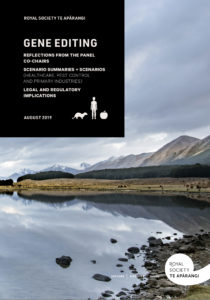Gene editing papers welcomed |
By Prof Jon Hickford NZIAHS President |

I welcome the papers by the Royal Society Te Aparangi which highlight the considerable benefits gene editing can bring to our lives and the advice of the society’s expert panel that it’s time for an overhaul of the regulations around gene editing.
The panel’s findings follow earlier reports on gene editing in healthcare, primary industries and pest control and call for a more nuanced view of gene technologies, recognising that some applications may be more acceptable to New Zealand communities than others.
I agree with the panelthat New Zealand needs to further discuss the issues.
Scientists have a role to play by providing the scientific facts and data that will inform public opinion in a form that lay people can easily understand. Correction – on second thoughts, scientists have a responsibility to play this role.
But I am a bit disappointed by the cautious response from David Parker, Minister for the Environment, and more so with the lack of a response from Dr Megan Woods, Minister of Research, Science and Innovation.
Mr Parker’s citing of the ‘precautionary principle’ is wearing very thin given the lack of verifiable evidence from any quarter to suggest the existing GM food technologies (and products that many of us eat every day) are a hazard.
Political mood on Gene editing is changing |
By Bob Edlin Editor of AgScience |
 Newspaper headlines summed up the change in sentiment: while at Stuff the story was headed Our GE legislation due for an overhaul.
Newspaper headlines summed up the change in sentiment: while at Stuff the story was headed Our GE legislation due for an overhaul.
The catalyst for a flurry of media reports about genetic modification and the strict laws that govern the science in this country was a set of papers from an expert panel set up by Royal Society Te Apārangi to consider the implications of new technologies that allow much more controlled and precise gene editing.
The experts concluded it’s time for an overhaul of the regulations and said there’s an urgent need for wide public discussion and debate about gene editing within and across all New Zealand communities.
They produced summary discussion documents, as well as more-detailed technical descriptions, for each of the three scenario areas –
- Healthcare;
- Environmental pest management; and
- Primary industries.
They also examined New Zealand’s legal and regulatory framework in the context of the scenarios considered.
The response from the Government was instructive. It was released not by the country’s science minister, Dr Megan Wood, but by the Minister for the Environment, David Parker. This reflects the Environmental Protection Authority having been given responsibility for approving GMO research under the Hazardous Substances and New Organisms Act.
Mr Parker’s statement suggested there’s a mood within the government to move on gene editing related to health care but not primary industries. He said he was aware there are instances where gene editing techniques could be applied to improve the lives of New Zealanders and agreed with the Prime Minister’s Chief Science Advisor that there is a spectrum of genetic modification.
There’s a hint in the statement that any liberalising will be extended first to medical science. Mr Parker said he has asked officials to advise him of where lower regulatory hurdles ought to be considered to enable medical uses that would result in no inheritable traits, or laboratory tests where any risk is mitigated by containment.
The recommendation to clarify conflicting or inconsistent definitions across the regulatory framework will also be considered.
“Although New Zealand takes a precautionary approach, advancements in gene editing are not prohibited,” Mr Parker said.
“There are already instances where the EPA has approved the use of modified organisms, for example Pexa-Vec currently used in clinical trials for the treatment of liver and kidney cancer.”
So what does the Minister for Research, Science and Technology think? Dr Woods did not respond to AgScience’srequest for comment.
The National Party more appropriately put matters in the hands of its spokesperson for Research, Science and Innovation, Dr Parmjeet Parmar, who said the Royal Society’s report shows that GM legislation needs to be updated because the restrictions it imposes are disproportionate to the risks given the latest advancements in the field of gene-editing.
“The Government needs to stop letting its ideology get in the way and let the science speak for itself,” she said.
“The Hazardous Substances and New Organisms Act was drafted when the current advancements couldn’t have even been imagined. It’s now time for the law to catch up with reality.”
National has committed to modernising the rules around biotechnology in both our environment and primary industries discussion documents, Dr Parmar said.
Strict regulations under the Hazardous Substances and New Organisms Act are administered by the Environmental Protection Authority. They have tightly controlled the use of genetic engineering and genetically modified organisms in New Zealand since 2003.
But pressure had been mounting in recent months for a review, some of it – significantly – coming from prominent scientists.
The Prime Minister’s chief science advisor, Professor Juliet Gerrard, said the country’s working legal and regulatory frameworks were struggling to cope with technologies that hadn’t been invented when the laws were written two decades ago.
“We need a framework that is future proof and enables us to focus on the issues, not the loopholes,” she told the New Zealand Herald.
“Such a framework needs to facilitate a broad public conversation.”
Her predecessor, Professor Sir Peter Gluckman, weighed in, too, in a keynote speech to Horticulture NZ’s conference at Hamilton’s Mystery Creek. He said the new technologies could offer “enormous potential” for a country that was, and likely always would be, a biological-based economy.
“If our country does not periodically consider how to use or not use evolving technologies, we run the risk of becoming a backwater with a declining competitive position,” he said.
While he also said it was not for science to decide on technologies, he questioned whether the traditional political processes “are the appropriate way to deal with the complexities of the interplay between science, values and world views.”
Sir Peter said new models of adaptive regulatory oversight are needed globally. Similarly, new models of bringing science and citizens together to discuss these “issues of post-normal science” are needed.
BiotechNZ chief executive Dr Zahra Champion agreed, noting that New Zealand was “built on innovation” and needed to be part of cutting-edge science.
She said tools like gene editing could complement other technologies to tackle global issues, such as climate change.
Meanwhile the country’s prohibitive GM laws are impeding the development of ryegrass with the potential to reduce farm emissions.
According to a recent press statement from AgResearch, the Government’s Interim Climate Change Committee mentioned the Crown research institute’s work in advice on the inclusion of agriculture in the Emissions Trading Scheme: “NZ’s rules on genetic modification could be a barrier to developing lower emissions technologies. One such example is a genetically modified ryegrass that has been developed by scientists at AgResearch but has had to go through field trials in the United States due to NZ’s rules on genetic modification.
“The science surrounding genetic modification has evolved. Other countries have changed their rules in recent years, and it is not uncommon for livestock overseas to eat genetically modified feeds.
“On the flip side, being free of genetic modification provides a unique characteristic that NZ products can trade on. As flagged by the Royal Society and others, it could be timely for NZers to have an open debate about the use of genetic modification in NZ.”
AgResearch says it is working on whether the ryegrass could move to NZ-based field and animal nutrition trials from 2021. “This comes as the Government is advised again it should have another look at the laws around gene technologies by climate change advisors,”
Advice is one thing – decisions another. When questioned by Parliament’s environment select committee recently, Environment Minister David Parker acknowledged that no review of the legislation was being undertaken.
But two of his Cabinet colleagues, Forestry Minister Shane Jones (here) and Agriculture Minister Damien O’Connor (here), say they are willing at least to encourage a discussion about GE.
Mr Jones told the New Zealand Herald: “Let’s push the waka out and find out whether or not what we are taking as gospel is indeed still, in this new climate change environment, the gospel we want to believe in,”
MrO’Connor said a “sensible, mature conversation” was needed.
He said he recognised worries that opening New Zealand to genetic modification could result in reduced access to overseas markets where people increasingly are concerned about what they eat for health and environmental reasons. But genetic engineering around the world is opening opportunities that should not be ignored.
And – would you believe it? – Climate Change Minister James Shaw, from the Green Party, said the Government will have to look at New Zealand’s genetic modification laws.
According to the New Zealand Herald, he said: “If we are going make progress on this, if they are challenging us and saying that they think the regulatory environment we have essentially fails us in terms of producing the climate outcomes that we need, then we need to take a look at them.”
But no decisions had been made, he insisted, and the government would have to be “incredibly careful” about changes.
The reputation New Zealand has won for the purity of its food was among his considerations and his Green Party colleagues are not budging in their opposition to relaxing the rules.
Conservation Minister Eugenie Sage – a Green Party MP – has blocked genetic engineering work being conducted as part of the Government’s predator-free programme.
 Meanwhile, research overseas says learning the science behind GMO foods could change people’s minds about them, if they are scared.
Meanwhile, research overseas says learning the science behind GMO foods could change people’s minds about them, if they are scared.
A recent study found people’s attitudes about GM foods could be changed by teaching them the basic science behind it. The researchers avoided any claims that GM foods were safe or unsafe, good or bad. Instead, they focused simply on providing the basic scientific information about them in an accessible way and gave people the opportunity to reflect on their beliefs and questions.
“We asked them to come to their own decisions about the issue and, at the end of the study, people were more positive toward GM foods overall,” said one of the research team, who proceeded to ask: “So, where do we go from here?”
His answer: “Perhaps this should raise the awareness among scientists to communicate the science behind GMOs—instead of trying to convince people that GMOs are not bad for them, teach them about the basic science. Science is amazing, awe-inspiring, challenging and exciting. We scientists need to focus more on teaching people what we know.
“More importantly, though, scientific advancements are necessary for our survival. Advances such as creating better crops, developing new vaccines, understanding why our climate is changing and coming up with ways to combat it rely on cutting-edge science. By simply giving people more information in an accessible way, we are giving them the tools to make better decisions—the decisions that will ultimately decide our future.”











